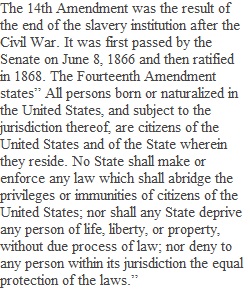


Q This discussion addresses the following outcomes: • Examine the Thirteenth, Fourteenth, and Fifteenth amendments to the Constitution and consider their impact on American politics and society (CO#4, CO#5). • Speculate on the impact of Reconstruction’s failure for African Americans into the late nineteenth century (CO#3, CO#5, CO#6/Gen. Ed. Outcome 4.2). When the Civil War ended in 1865, the federal government made a conscious effort to establish the status of former slaves (freemen and women) and to integrate black Americans into the political mainstream. To assure this process, the United States passed the Thirteenth (1865) and Fourteenth Amendments (1868). In addition, the Fifteenth Amendment (1870) ensured voting rights for black men. The Reconstruction period lasted until 1877 but its impact continued well after that. In preparation for our discussion be sure to read the Module Notes, Chapter 15: “Reconstruction (Links to an external site.)” in The American Yawp, and Grimsley, M. (2012), Wars for the American South: The First and Second Reconstructions Considered as Insurgencies (Links to an external site.). In addition, consult the wording of the 13th (Links to an external site.), 14th (Links to an external site.), and 15th (Links to an external site.) Amendments to the US Constitution. Using the primary and secondary sources above as evidence, consider the following in a post of at least 250 words: • Choose one of the three amendments (13th, 14th, or 15th) to focus on for your post: what was the amendment's short and long-term impact on American history? • Why and how did Reconstruction fail to protect the rights of black Americans? How did this failure continue to shape American politics and social relations afterward? Then, over the course of the week, respond to the posts of at least two of your classmates.
View Related Questions